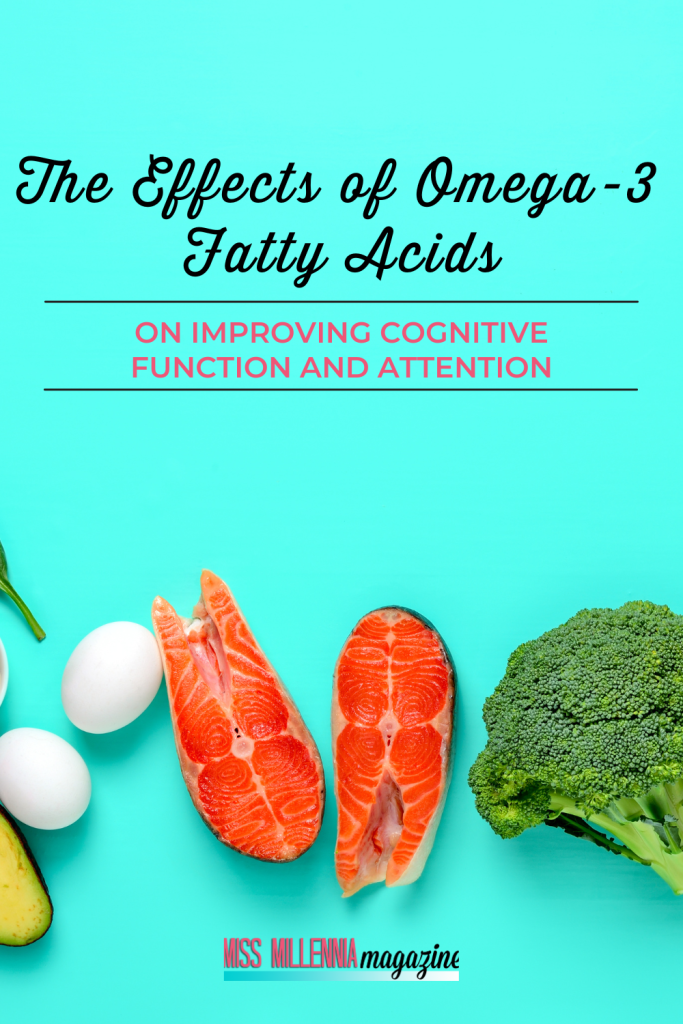The Effects Of Omega-3 Fatty Acids On Improving Cognitive Function And Attention

Are you struggling with attention deficit disorder or cognitive function? If so, Omega-3 fatty acids may be the key to bringing your brain back on track. In this blog post, I will discuss the effects of Omega-3 fatty acids on improving cognitive functions and attention span and how they can help in other areas, such as psychiatric disorders and cardiovascular diseases.
By understanding the mechanisms of action behind these essential nutrients, we are equipped for proper nutrition for a healthy brain. For example, you can get Omega-3 fatty acids in pills if you cannot differentiate the food which contains it from others; all you need is to buy it from medambien.
What are Omega-3 fatty acids, and why are they important?
Omega-3 fatty acids are essential fat our bodies cannot produce and must be obtained through diet. These fats play a crucial role in cognitive function. They help maintain healthy brain cell membranes and support neurotransmitter activity. Omega-3 fatty acids have been linked to improved memory, mental processing speed, and executive function, all critical components of cognitive health.
Additionally, research has shown that Omega-3 fatty acids may reduce the risk of cognitive decline and age-related cognitive impairment. Therefore, we must incorporate Omega-3-rich foods like fish, flax seeds, and walnuts to ensure optimal mental health.
How can Omega-3 fatty acids help?
Research has shown that adding omega-3 fatty acids can significantly improve cognitive function and attention span. These essential fatty acids are found in oily fish such as salmon, mackerel, and sardines. It is believed that omega-3s support the brain by promoting the growth and development of neurons and inflammation reduction. Studies have shown that individuals who consume omega-3s regularly have improved memory, concentration, and overall brain function.

With a growing number of individuals experiencing cognitive decline, incorporating omega-3s into their diet is essential. However, it is necessary to remember that omega-3 supplementation cannot cure mental disorders or replace medication. However, it is a dietary aid that can support brain health and function.
Benefits of consuming Omega-3-rich foods and supplements
Omega-3 fatty acids are essential nutrients the body cannot produce and must be obtained through diet or supplements. Consuming omega-3-rich foods and supplements is linked to a variety of health benefits. These fatty acids help reduce inflammation, a common underlying cause of many chronic diseases.
Additionally, omega-3s are essential for brain health as they are a significant brain and nervous system component. They have also been linked to improved heart health by reducing triglycerides, blood pressure, and the risk of heart disease. Therefore, including omega-3-rich foods like fatty fish, flaxseeds, and walnuts in your diet or taking supplements can be an easy and effective way to improve your overall health.
Potential risks associated with taking too much Omega-3
Omega-3 fatty acids, found in fatty fish and certain plant oils, have long been promoted as beneficial to human health. However, as with any supplement, taking too much of it can pose potential risks. One of the most common side effects of excessive Omega-3 consumption is an upset stomach, which may lead to diarrhea and vomiting.
Furthermore, taking high doses of Omega-3 supplements can increase the risk of bleeding and may interact with blood-thinning medications. Therefore, despite the potential health benefits, it is crucial to exercise caution when consuming Omega-3 supplements and to consult with a healthcare professional before making any changes to your diet.
How to incorporate more Omega-3
Incorporating Omega-3 into your daily diet is not as difficult as it may seem. This essential fatty acid is found in various foods such as fish, nuts, seeds, and vegetables. One of the easiest ways to increase your Omega-3 intake is by consuming fatty fish such as salmon, mackerel, or sardines at least twice a week.

In addition, you can add nuts such as walnuts and almonds to your breakfast cereal or snack throughout the day. Chia seeds and flaxseeds are also excellent sources of Omega-3 and can be added to smoothies, salads, or baked goods. Another option is to try Omega-3 supplements as pills or liquid. With a little effort, you can easily incorporate more Omega-3 into your diet and reap the health benefits of it.
The importance of having a balanced diet
Maintaining a balanced diet with Omega-3 fatty acids and other essential nutrients is crucial for a healthy lifestyle. Omega-3s are polyunsaturated fat that our bodies cannot produce, meaning we must obtain them from food sources. In addition, they support brain function and reduce inflammation, a key risk factor for chronic diseases such as heart disease and arthritis.
Alongside Omega-3s, it is essential to incorporate a variety of vitamins and minerals into your diet to ensure that your body receives the adequate nourishment it needs. In addition, these nutrients promote a healthy immune system, support bone strength and muscle function, and regulate hormones. Thus, it is pivotal to maintain a balanced diet to optimize your well-being and prevent illness.
Conclusion
In conclusion, omega-3 fatty acids are essential for cognitive health. These beneficial compounds can help improve cognitive function and attention span when taken in the right amounts. Eating foods rich in Omega-3 fatty acids, such as fish, nuts, and avocados, is a great way to incorporate Omega-3 fatty acids into your daily diet.
Additionally, supplements may be beneficial if dietary sources are insufficient to meet your needs. However, taking too much Omega-3 can pose risks, so regulated and moderate doses should be consumed Only after consulting with a physician. A balanced diet that includes Omega-3 fatty acids and other vital nutrients will provide optimal mental functioning, allowing you to stay focused and alert throughout each day.








